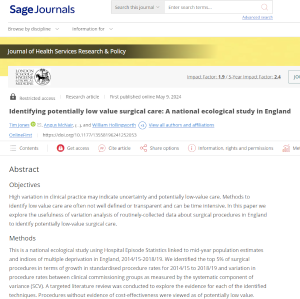Helping the NHS more quickly identify potentially ‘low value’ surgical procedures
20 August 2024
Analysing hospital records for surgical procedures with high geographical variation or growth rate could help identify ‘low value’ procedures more quickly, according to a new study in the Journal of Health Services Research and Policy. The study, led by National Institute for Health and Care Research (NIHR) funded researchers at the University of Bristol, aimed to help the NHS more easily identify surgical procedures that could be stopped or reduced (‘de-adopted’).
Research often shows that some common NHS treatments don’t work as well as previously thought. These treatments are sometimes called ‘low-value’, meaning the benefits don’t justify the risks and costs.
The NHS identifies such procedures through its Evidence Based Interventions programme. The programme draws on a range of sources including NICE guidelines, international recommendations, America’s ‘Choosing Wisely’ initiative and geographical variation.
The research team thought that a relatively simple way to identify low value surgical procedures would be to look at how their use varies between different areas of the country. If there’s a lot of variation, after accounting for other differences between areas such as age and sex, this could indicate that surgeons aren’t sure about how effective a technique is.
They also looked at procedures where use was growing. This could highlight new procedures without good evidence underpinning them before they become common practice.
The analysis could then be followed up with a targeted evidence review.
The researchers, from NIHR ARC West and Health Economics Bristol, examined hospital records from 2014/15 to 2018/19. They identified the top 5% of techniques in terms of growth or geographical variation.
They then did a targeted literature review to gather evidence about how effective each procedure is and whether they offer value for money.
They found 6 surgical procedures that had high growth over the 5 years:
- Deep brain stimulation for involuntary posturing
- Removal of prostate
- Decompressing nerves in the neck
- Joint surgery for traumatic dislocation and fracture
- Hip joint replacement with a cemented femoral component
- Shoulder joint replacement without cement
They found 4 with a lot of geographical variation:
- Bariatric bypass
- Radiofrequency denervation of nerves to alleviate pain
- Total knee replacement (uncemented)
- Hip joint replacement with a cemented pelvic component
Following the literature review, they concluded that there was very little or no evidence for the cost-effectiveness of 8 of the 10 procedures.
Bariatric bypass and total knee replacement (uncemented) were effective and good value for money compared to non-surgical alternatives. Although there was still some uncertainty around the best surgical technique for these procedures.
There was very limited evidence on the cost-effectiveness of removal of prostate and deep brain stimulation for involuntary posturing.
Dr Hugh McLeod, Senior Lecturer in Health Economics, University of Bristol, said:
“Since 2019, the NHS Evidence Based Interventions programme has identified potential targets for de-adoption. It brings together evidence from a number of sources.
“However, we think our analysis is a relatively quick and effective technique to identify potentially low value surgical procedures. This simple analysis could be undertaken on a regular basis to find hospital procedures that may not provide good value to patients and the health service.
“We recommend investigating the 8 surgical procedures with little or no evidence of cost effectiveness in more detail. This would involve analysing the data on these procedures, more thorough systematic reviews of the research literature, and conversations with health professionals and commissioners. In many cases these procedures are already being investigated through clinical trials so the results will shed light on which procedures could be de-adopted.”
Paper
